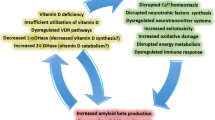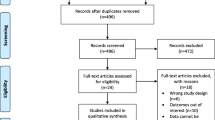Abstract
A high circulating concentration of the non proteinogenic amino acid homocysteine has been implicated as a risk factor for Alzheimer’s Disease and its prodromal stage, mild cognitive impairement. Furthermore, hyperhomocysteinaemia has been directly attributed to a deficiency in vitamins B12, folate, and B6. Several studies have demonstrated decrease in progression of mild cognitive impairement to Alzheimer’s Disease, and some have even shown an improvement in cognition after vitamin supplements with B12 and folate. Plausible mechanisms linking hyperhomocysteinaemia to Alzheimer’s and cognitive impairement have been hypothesized and demonstrated in hyperhomocysteinemic mice models. However, some studies have not elucidated any benefit of vitamin supplements in subjects with cognitive impairment. Hence, multicentric clinical studies need to be conducted to substantiate the mechanisms of neuronal degeneration due to hyperhomocysteinaemia and to demonstrate the beneficial effect of folate, B6 and B12 supplements on cognition.

Similar content being viewed by others
References
Liu CC, Kanekiyo T, Xu H, Bu G. Apolipoprotein E and Alzheimer disease: risk, mechanisms and therapy. Nat Rev Neurol. 2013;9(2):106–18.
Bhargava S, Srivastava LM. Homocysteine—Marker of the millenium—a review of its evolution and clinical implication. J Med Sci. 2001;4(2):104–16.
Bhargava S, Parakh R, Manocha A, Kankra M, Aggarwal CS, Menon G, et al. High prevalence of hyperhomocysteinemia among Indian patients of vascular disease. Clin Chim Acta. 2006;374(1–2):160–2.
Snowdon DA, Greiner LH, Mortimer JA, Riley KP, Greiner PA, Markesbery WR. Brain infarction and the clinical expression of Alzheimer Disease—The Nun Study. JAMA. 1997;277(10):813–7.
Neuropathology Group. Medical Research Council Cognitive Function and Aging Study. Pathological correlates of late-onset dementia in a multicentre, community-based population in England and Wales. Neuropathology Group of the Medical Research Council Cognitive Function and Ageing Study (MRC CFAS). Lancet. 2001;357(9251):169–75.
McCaddon A, Davies G, Hudson P, Tandy S, Cattell H. Total serum homocysteine in senile dementia of Alzheimer type. Int J Geriatr Psychiatry. 1998;13:235–9.
Wang HX, Wahlin A, Basun H, Fastbom J, Winblad B, Fratiglioni L. Vitamin B12 and folate in relation to the development of Alzheimer’s disease. Neurology. 2001;56:1188–94.
Williams JH, Pereira EA, Budge MM, Bradley KM. Minimal hippocampal width relates to plasma homocysteine in community-dwelling older people. Age Ageing. 2002;31:440–4.
Kruman II, Kumaravel TS, Lohani A, Pedersen WA, Cutler RG, Kruman Y, et al. Folic acid deficiency and homocysteine impair DNA repair in hippocampal neurons and sensitize them to amyloid toxicity in experimental models of Alzheimer’s disease. J Neurosci. 2002;22:1752–62.
Mallroy SP, Dynan KB, Lawson JT, Patterson CC, Passmore AP. Moderately elevated plasma homocysteine, methylenetetrahydrofolate reductase genotype, and risk for stroke, vascular dementia, and Alzheimer disease in Northern Ireland. Stroke. 2002;33:2351–6.
Qadri P, Fragiacomo C, Pezzati R, Zanda E, Forloni G, Tettamanti M, et al. Homocysteine, folate and vitamin B-12 in mild cognitive impairment, Alzheimer’s Disease and vascular dementia. Am J Clin Nutr. 2004;80:114–22.
Schafer JH, Glass TA, Bolla KI, Mintz M, Jedlicka AE, Shwartz BS. Homocysteine and cognitive function in a population-based study of older adults. J Am Geriatr Soc. 2005;53:381–8.
Bhargava S, Ali A, Bhargava EK, Manocha A, Kankra M, Das S, et al. Lowering homocysteine and modifying nutritional status with folic acid and vitamin B12 in Indian patients of vascular disease. J Clin Biochem Nutr. 2012;50(3):222–6.
McCaddon A. Homocysteine and cognitive impairment—a case series in a general practice setting. Nutr J. 2006;5:6.
Aisen PS, Schneider LS, Sano M, Diaz-Arrastia R, van Dyck CH, Weiner MF, et al. High-dose B vitamin supplementation and cognitive decline in Alzheimer disease: a randomized controlled trial. JAMA. 2008;300:1774–83.
Malouf M, Grimley EJ, Areosa SA. Folic acid with or without B12 for cognition and dementia. Cochrane Database Syst Rev 2003; (4):CD004514.
Smith AD, Smith SM, de Jager CA, Whitbread P, Johnston C, Agacinski G, et al. Homocysteine-lowering by B vitamins slows the rate of accelerated brain atrophy in mild cognitive impairment: a randomized controlled trial. PLoS ONE. 2010;5(9):e12244.
Smach MA, Jacob N, Golmard JL, Charfeddine B, Lammouchi T, Ben Othman L, et al. Folate and homocysteine in the cerebrospinal fluid of patients with Alzheimer’s disease or dementia: a case control study. Eur Neurol. 2011;65(5):270–8.
Zheng L, Kong X, Cui Y, Wei Y, Zhang J, Wei W. Conversion from MCI to AD in patients with the APOE ε4 genotype: prediction by plasma HCY and serum BDNF. Neurosci Lett. 2016;626:19–24.
Lee HK, Kim SY, Sok SR. Effects of Multivitamin Supplements on Cognitive Function, Serum Homocysteine Level, and Depression of Korean Older Adults With Mild Cognitive Impairment in Care Facilities. J Nurs Scholarsh. 2016;48(3):223–31.
Lomnadze D, Roberts AM, Tyagi N, Moshal KS, Tyagi SC. Homocysteine causes cerebrovascular leakage in mice. Am J Physiol Heart Circ Physiol. 2006;290(3):H1206.
Kumar M, Tyagi N, Moshal KS, Sen U, Kundu S, Mishra PK, et al. Homocysteine reduces blood flow to brain due to vascular resistance in carotid artery. Neurochem Int. 2008;53(6–8):214–9.
Bhargava S, Pushpakumar S, Metreveli N, Givvimani S, Tyagi SC. MMP-9 gene ablation mitigates hyperhomocysteinemia-induced cognition and hearing dysfunction. Mol Biol Rep. 2014;41(8):4889–98.
Chan AY, Alsaraby A, Shea TB. Folate deprivation increases tau phosphorylation by homocysteine-induced calcium influx and by inhibition of phosphatase activity: alleviation by S-adenosyl methionine. Brain Res. 2008;1199:133–7.
Author information
Authors and Affiliations
Corresponding author
Ethics declarations
Conflicts of Interest
None.
Human Participants/Animals
This article does not contain any studies with human participants or animals performed by any of the authors.
Informed Consent
Since this is a review, there is no patients’ informed consent involved.
Rights and permissions
About this article
Cite this article
Bhargava, S., Bhandari, A. & Choudhury, S. Role of Homocysteine in Cognitive Impairement and Alzheimer’s Disease. Ind J Clin Biochem 33, 16–20 (2018). https://doi.org/10.1007/s12291-017-0646-5
Received:
Accepted:
Published:
Issue Date:
DOI: https://doi.org/10.1007/s12291-017-0646-5




